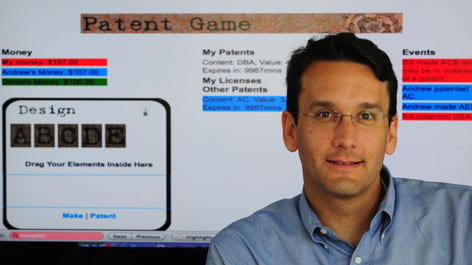Study finds patent systems may discourage innovation
Bill Tomlinson, informatics assistant professor, uses a computer game to test the efficiency of the U.S. patent system, and it doesn’t score well.

A new study challenges the traditional view that patents foster innovation, suggesting instead that they may hinder technological progress, economic activity and societal wealth. These results could have important policy implications, because many countries count on patent systems to spur new technology and promote economic growth.
To examine the effect of patents on technological innovation, Bill Tomlinson of UC Irvine’s Donald Bren School of Information & Computer Sciences and Andrew Torrance of the University of Kansas School of Law developed an online game simulating the U.S. patent system.
PatentSim features an abstract model of the innovation process, a database of potential innovations and a network through which users can interact with one another to license, assign, buy, infringe and enforce patents. The software allows players to simulate the innovation process under a traditional patent system; a “commons” system, in which no patent protection is available; or a system with both patents and open-source protection.
“In PatentSim, we found that the patent system did not work to spur innovation,” said Tomlinson, associate professor of informatics. “In fact, participants were more likely to innovate when there was no intellectual property protection at all, or when they could open-source their innovations and share them with other people.”
The researchers measured the efficacy of the three systems based on innovation, the number of inventions; productivity, a measure of economic activity; and societal wealth, the ability to generate money.
Players were first-year law students who had never had intellectual property coursework. Tomlinson and Torrance plan further studies with subjects of different backgrounds, including M.B.A. students at Harvard University.
“Current patent laws are based on century-old assumptions that patents spur technological progress, and few have questioned this,” said Torrance, associate professor of law. “If it turns out that our laws are based upon misinformation and bad assumptions, society may be failing to promote beneficial new technologies that could improve quality of life.”
The study was published recently in The Columbia Science & Technology Law Review. The full paper, “Patents and the Regress of Useful Arts,” is among the top-10 most uploaded law and economics publications recently on the Social Science Research Network Web site, the leading database of scholarly social sciences publications. It may be downloaded for free.